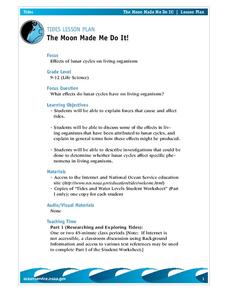NOAA
Vertebrates I
I spy a spine. The 19th installment of a 23-part NOAA Enrichment in Marine sciences and Oceanography (NEMO) program explores vertebrate species, such as sharks and other fish. Learners take part in an activity evaluating the...
NOAA
Currents
Learn how ocean currents are vital to humans and marine life. The eighth installment of a 23-part NOAA Enrichment in Marine sciences and Oceanography (NEMO) program, focuses on ocean currents and how they affect global climate. The...
Chicago Botanic Garden
Recent Weather Patterns
Decide whether weather is changing! A two-part activity first challenges classes to review the differences between weather and climate. Once finished, individuals then analyze historical data to determine if climate change is happening...
National Park Service
The Water Cycle Game
Take young scientists on a trip through the water cycle with this interactive science activity. After setting up a series of ten stations representing the different places water can be found, children use the included printable dice...
American Chemical Society
Molecules Matter
Did you know that jumping spiders sometimes wear water droplets as hats? A seventh grade science lesson introduces the concept of what makes up water: tiny molecules that are attracted to each other. Starting with a...
Discovery Education
Smoke on the Water
How do clouds form? Learners demonstrate the formation of clouds and the water cycle by testing four different setups in a plastic bottle. They identify the key components of a cloud to help them understand the process of cloud...
NOAA
What's the Difference?
Due to the isolation of seamounts, their biodiversity offers a great deal of information on the development of biological and physical processes. Pupils use simple cluster analysis to rate the similarity and differences in biological...
EduGAINs
Go Eco! Ecosystems
How is a movie theater like a desert biome? Compare systems to ecosystems with a set of activities that focuses on accessing multiple intelligences and building upon knowledge. As learners discuss the ways elements of an ecosystem depend...
NOAA
Technology II
Ping, ping, ping. The last installment of a 23-part NOAA Enrichment in Marine sciences and Oceanography (NEMO) program explores technology use in marine studies, such as sonar. Activity involves simulating sonar techniques to identify a...
Messenger Education
Look But Don’t Touch—Exploration with Remote Sensing
Mars is home to the tallest mountain in our solar system, Olympus Mons. In this set of two activities, learners review geologic land formations through the analysis of aerial maps. They then apply this knowledge to aerial maps of objects...
Curated OER
Shake, Rattle and Roll
Young scholars compare the weathering of materials. in this weathering lesson, students experiment with the chemical and physical weathering of different materials. Young scholars use salt and water as an example of how weathering occurs.
Curated OER
Environment" The Mining Cycle
Students explore the world of mining and explain its importance in daily life. After describing how companies search for mineral deposits, they examine the environmental consequences of mining as well as the positive aspects. The...
Curated OER
Solar Energy - Dehydration
Sixth graders explore process of drying food using solar energy. They cook and/or dry food such as pumpkins, watermelon, corn, and deer meat, explain how solar energy changes foods, and compare and contrast solar energy with other forms...
Curated OER
Introduce Solids
Learners identify and interpret a variety of solid materials - cloth, wood, metal, plastic, paper, and rubber. After a period of free exploration, they then describe the properties of the objects and develop vocabulary in order to...
Curated OER
Rocks
Students use their five senses to experience different types of rocks. In groups, they compare and contrast the information they collected. They observe rocks in their local community and describe their uses to the class.
Curated OER
Observing Rocks
Fifth graders explore the various properties of earth and rocks. They play "Twenty Questions" with the teacher, and analyze a rock using a magnifying glass. They record their rock observations and list the differences between the wet...
Curated OER
Landforms in a Tub
Fifth graders use common household items to build landforms and simulate weathering and erosion.
Curated OER
Plate Tectonics
In this science worksheet, students use basic scientific concepts to complete the series of puzzles that are intended to increase science literacy and focusing upon plate tectonics.
Curated OER
The Moon Made Me Do It!
High schoolers research about how lunar cycles affect living organisms. In this biology lesson, students prepare an oral presentation of their research results and analyses. They explore the forces that affect tides.
Curated OER
Exploring Meteorite Mysteries: Building Blocks of Planets
Students simulate the formation of chondrites and asteroids. In this astronomy instructional activity, students demonstrate accretion using balloons and static electricity. They compare and contrast their models to the actual process of...
Curated OER
Analyzing The Research Of The Earth
Young scholars investigate the concept of technology. They are taught about various science applications and how the technology is used in the disciplines. Students pick a subject to research and then indicate the technologies related to...
Curated OER
Powering a Green Earth
Students compare and contrast renewable and nonrenewable energy. In this environmental science instructional activity, students discuss the importance of going green. They identify the different components in a power grid system.
Curated OER
Field Research Project: Comparing the Parent Rock Material of the San Francisco Terranes With Local Soil Types
Students investigate rocks and minerals and take a field trip to sample soils. They analyze rocks and soil, research the geological terrenes of the topology of San Francisco, and produce a lab research report.
Curated OER
Earth Day Trash Survey Unit
Students develop an action plan to prevent trash from becoming a problem in the future.

























